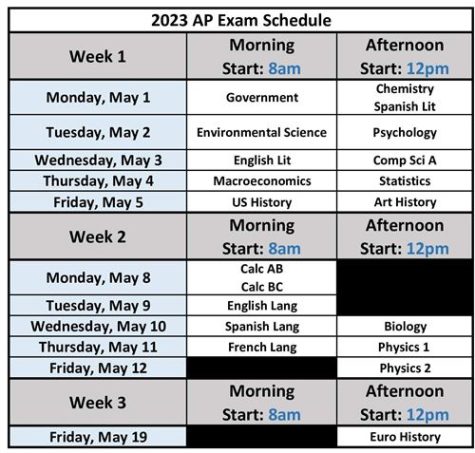AP Exams: What to Know and Tips to Prepare
April 25, 2023
Spring has sprung; the weather has gotten warmer, and students are getting ready for the end of the school year and the start of summer. However, this time of year is also marked by the dreaded AP Exam weeks. From Monday, May 1st, to Friday, May 12th, students will test their knowledge in these challenging courses. Good scores on the exams can be very beneficial to students; many colleges will accept certain scores as credits for that class, although the scores and subjects accepted varies from school to school.
General Info

Specific information regarding the exams will likely be sent out to students in the coming weeks, but there are a few general things that have been shared so far. Morning exams will begin at 8:00 AM, followed by the second set of tests at 12:00 PM (as well as one test at 2:00 PM). Most exams take about 2-3 hours. Room assignments will be shared later, but students will take the exams in specific classrooms at West designated for that exam. Because they occur during normal school days, students will be excused from the classes that coincide with their exams, but they are expected to attend their other classes. For more information, including things you can and can’t bring on test day, the timing and number of questions, and the score breakdown, check the College Board website.
Tips
AP exams can be a source of stress for many students, but, as many teachers would say, the best way to reduce this stress is to prepare well. It’s important to remember that everything you have done in the class—notes, studying, taking tests—has helped you prepare. That being said, going back and simply rereading notes or the textbook might not be the most effective strategy. Instead, there are other study skills that can help you showcase your hard work and progress.
It’s important to familiarize yourself with the exam. Many tests have their own unique format, with a mix of multiple choice and free response questions. Knowing the breakdown of the test, including sections, types of questions and number, and timing, can ease some test-day stress. Many students also like to get an idea of the score breakdown, to know the number of multiple-choice questions and free response points you need to get in order to receive your target score.
Another way to prepare is to utilize all your resources. Teachers have likely given out or mentioned various resources that you can use in preparation, and they would also gladly provide more if you asked. Furthermore, there are a plethora of helpful resources online. The College Board also posts AP Daily Videos, where teachers will explain a certain concept and often include an example question; they also post past exams that can used for practice. Each course also has an AP Exam prep book with a lot of great information and extra practice. In addition to that, a simple search online can take you to Quizlets with vocab, practice problems with explanations, and YouTube videos of someone explaining a concept or how to tackle a free-response question. These resources can provide you with information from another perspective, as well as an opportunity to apply your knowledge.

Practice multiple choice and free-response tests are a great way to test what you know and what you need to review. Taking practice tests can further familiarize you with the format of the questions that you will be asked on the test, as AP Exams are known to feature some questions that are tricky to understand and answer in the moment. A tip for approaching practice tests is to stick to the actual exam timing as best you can. Pacing can be a struggle for many students, but practicing answering questions efficiently can make it easier when it’s time for the real thing.
Like other tests, it’s important to prepare yourself for the day of the exam by getting enough sleep, eating a good breakfast, and in general keeping yourself focused on the exam. It’s also important to not stress too much about the exam. It can be overwhelming but remember that the score you receive doesn’t necessarily show how well you did in the class, and, moreover, it won’t be put on your transcript or seen by schools unless you choose. Also remember that, if you put effort into both the class itself and the preparation, your hard work will pay off come test day.

